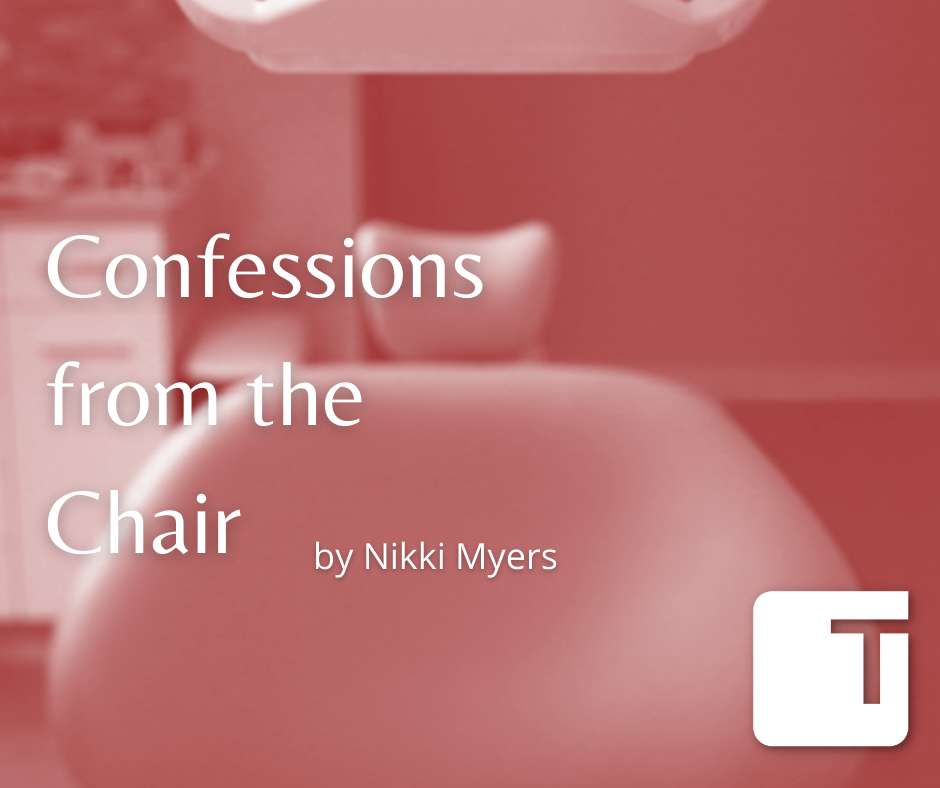It starts, believe it or not, with my nose. A little itch tingles, and I know I can’t just reach up and scratch it. There are hands at my face and little metal tools in my mouth. Faces behind those plastic shield things lean over me; all I can see is my mouth reflected in their masks. Claustrophobia and accompanying panic cause my heart rate to climb and my respiration to increase.
I confess to being a little nervous at the dentist’s office.
I haven’t always had this reaction to the dental chair. I used to happily jump in the chair to get my cleaning twice a year. But, after a panic attack during a root canal had me gasping for air, I have dreaded the dental chair with sweaty palms and hot flashes. It has been two decades since that first incident. Adopting a few relaxation techniques has helped me get through most routine cleanings, but the anxiety is still there.
This response has nothing to do with the staff or the doctor at the office. I’ve been to three different dentists since that root canal. No one is mean. No one has ever discounted my discomfort. No big monster has ever sprung out from behind the door to sit heavily on my chest to keep me from breathing. There have been, however, some staff who have helped me feel more comfortable. And from them, and my own experience, I can give you some advice about panicky patients.
We Need Space
There is not much to be done about the fact that you, dental staff, have to be able to see inside the mouth. Leaning over a patient, to some extent, is inevitable.
Take small breaks when the procedure permits. Backing off for even 30 seconds gives me room to have a deep breath and for fresh air to circulate over my face. This helps keep the feeling of claustrophobia from building.
We Like Comfort
Who doesn’t like comfort? Dental chairs have certainly progressed in patient comfort and staff convenience. Sling-type armrests can be adjusted to better support the upper arm, helping alleviate the pressure gravity puts on the shoulders. I can feel the difference. Without that support, my arms fall back along the chair and there is strain on my shoulders even with my forearms on traditional armrests. If not sling armrests, fold up a towel to place behind the upper arm.
If your patient has any type of lower backaches, having a comfortable tilt to the hips is critical for comfort. Ask your patient if they need to adjust before, and occasionally during, a long procedure. A rolled-up blanket under the knees, or a towel behind the lower back, can take off any uncomfortable pressure.
We May Need to Occupy our Hands
Bloodless knuckles grip the armrests as I concentrate on keeping my mouth open and my head still. One dental assistant pried my hands off the armrests and put them on a soft, pliable object in my lap. It turned out to be a stuffed bunny. I squeezed and petted the bunny, relaxing my hands and keeping the circulation moving in my fingers and arms. Relaxed hands led to more relaxed arms, which in turned lead to more relaxed shoulders, neck, etc.
We Don’t Like the Chit Chat
Don’t chit chat. Just get it done. Make the visit as swift and easy as possible. When you do need to speak to your patient about treatments or future appointments, slow down. The brain is coping, surviving, which makes processing other things more difficult. I find it easier to set any follow-up appointments, or pay deductibles, before I go to the chair instead of on the way out. Which does your anxious patient prefer?
This doesn’t mean you should never say anything. Check in to be sure we’re okay. Coach us if our breathing is too fast and shallow. The usual running commentary that may be your habit just prolongs what is happening.
We Appreciate the Little Things
If you find yourself with an anxious patient, it is too late to stop the anxiety. The anxiety started long before they walked into your office. It is a response the body has when the brain perceives a possible threat and can’t find a way to avoid it. It may not be rational to you, but the anxiety is real. The sights, the sounds, and even the scents in the office can exacerbate the response. Keep the conveniently laid-out instruments covered and out of sight. Keep air flowing through the office to minimize the leftover scents of antiseptics and that horrid burning smell, (What is that anyway?) so they dissipate quickly. Keep notes in your patient records indicating they have a difficult time with dentistry and what steps you took to make them comfortable.
Did having something to knead in their hands help? Then have the item ready next time. Be patient with us. Prepare what you can ahead of time to make us more physically comfortable. Adjust your usual office protocols and procedures where you can to accommodate our flow through your office.
An anxious patient who feels safe in your practice will stick with you.
Nikki Myers is Marketing Coordinator at Trojan Professional Services, Inc.

